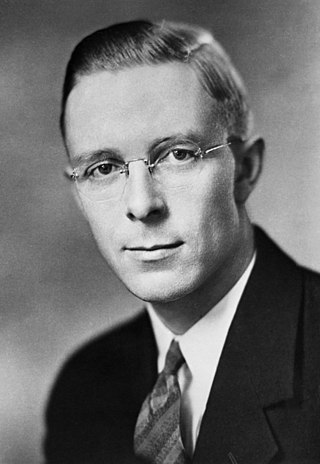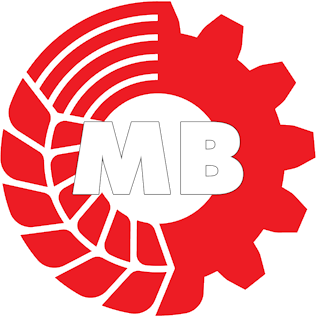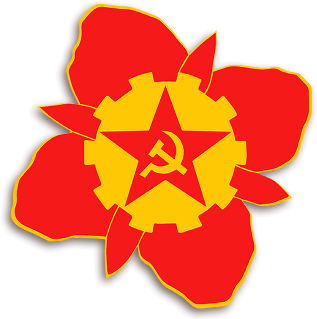
Ernest Charles Manning, was a Canadian politician and the eighth premier of Alberta between 1943 and 1968 for the Social Credit Party of Alberta. He served longer than any other premier in the province's history and was the second longest-serving provincial premier in Canadian history. Manning's 25 consecutive years as premier were defined by strong social conservatism and fiscal conservatism. He was also the only member of the Social Credit Party of Canada to sit in the Senate and, with the party shut out of the House of Commons in 1980, was its last representative in Parliament when he retired from the Senate in 1983.

The Communist Party of Canada is a federal political party in Canada. Founded in 1921 under conditions of illegality, it is the second oldest active political party in Canada, after the Liberal Party of Canada. Although it does not currently have any parliamentary representation, the party's candidates have previously been elected to the House of Commons, the Ontario legislature, the Manitoba legislature, and various municipal governments across the country.
The Natural Law Party of Canada (NLPC) was the Canadian branch of the international Natural Law Party founded in 1992 by a group of educators, business leaders, and lawyers who practised Transcendental Meditation.
The Libertarian Party of Canada is a federal political party in Canada founded in 1973. The party subscribes to libertarian and classical liberal tenets; its stated mission is to reduce the size, scope, and cost of government. Party policies include ending drug prohibition, ending government censorship, lowering taxes, protecting gun rights, ending laws criminalising the voluntary transfer of money for sex acts between consenting adults, and non-interventionism.
Unity, United Progressive Movement and United Reform were the names used in Canada by a popular front party initiated by the Communist Party of Canada in the late 1930s.

Miguel Figueroa is a Canadian political activist who was the leader of the Communist Party of Canada from 1992 to 2015. He is known for the landmark Figueroa case, which redefined the role of small parties and Canadian Parliamentary democracy, as well as his role re-establishing the Communist Party of Canada in the post-Soviet era.

The 1979 Canadian federal election was held on May 22, 1979, to elect members of the House of Commons of Canada of the 31st Parliament of Canada. It resulted in the defeat of the Liberal Party of Canada after 16 years in power, 11 of them under Prime Minister Pierre Trudeau. Joe Clark led the Progressive Conservative Party to power but with only a minority of seats in the House of Commons. The Liberals, however, beat the Progressive Conservatives in the overall popular vote by more than 400,000 votes. Taking office on the eve of his 40th birthday, Clark became the youngest prime minister in Canadian history.

The Communist Party of Canada – Manitoba is the provincial wing of the Communist Party of Canada for the province of Manitoba. Founded in 1921, it was an illegal organization for several years and its meetings were conducted with great secrecy. Until 1924, the "Workers Party" functioned as its public, legal face. For a period in the 1920s, the party was associated with the Canadian Labour Party. After 1920 it attracted former members of radical and syndicalist groups such as the Industrial Workers of the World (IWW). Many of the new members were Jews, Finns or Ukrainians who supported the Russian Revolution.
The Communist Party of Canada (CPC) fielded a number of candidates in the 2000 Canadian federal election, none of whom were elected. Information about these candidates may be found here.
The Communist Party of Canada (Marxist-Leninist) (CPC-ML) fielded 71 candidates in the 2006 federal election. Some of these candidates have their own biography pages. Information about others may be found here.

Socialism in Canada has a long history and along with conservatism and liberalism is a political force in Canada.
The Parti de la démocratie socialiste was a provincial political party in Quebec, Canada.
Norman Jaques was a Canadian farmer and federal politician. Jaques represented the electoral district of Wetaskiwin in the House of Commons of Canada from 1935 to 1949. Jaques was a member of the Social Credit Party.

The Pirate Party of Canada was a minor party in federal Canadian politics. Founded in 2009, the party officially registered with Elections Canada in 2010. The PPCA is modelled on the Swedish Pirate Party and advocates intellectual property reform, privacy protection, network neutrality and greater government openness. No member of the party has been elected to Parliament. The party officially deregistered on November 30, 2017.

The Communist Party of Quebec is a provincial political party in Quebec. It is affiliated with, but officially independent from, the Communist Party of Canada (CPC). The PCQ-PCC publishes the newspaper Clarté.

The Communist Party of Canada (Marxist–Leninist) is a federal political party in Canada. It was founded in 1970 by Hardial Bains, a staunch Stalinist and anti-revisionist. The CPC(M-L) has been registered with Elections Canada as the Marxist–Leninist Party of Canada (MLPC) since 1974, as the party is prohibited from using the name "Communist Party of Canada" in Canadian elections to avoid confusion among voters. The party is not an offshoot of the Communist Party of Canada; its early membership came from student-led organizations active in the 1960s. After a period of alignment with Maoism and China, the CPC(M-L) pursued a Hoxhaist, pro-Albanian line until the early 1990s. At present, the party directs most of its public support to Cuba and North Korea.
A communist front is a political organization identified as a front organization under the effective control of a communist party, the Communist International or other communist organizations. They attracted politicized individuals who were not party members but who often followed the party line and were called fellow travellers.
This page is based on this
Wikipedia article Text is available under the
CC BY-SA 4.0 license; additional terms may apply.
Images, videos and audio are available under their respective licenses.








